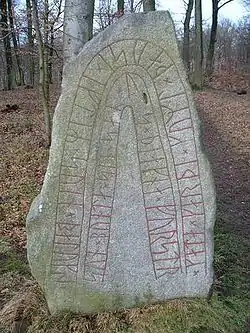Rydsgård Runestone
The Rydsgård Runestone, designated as DR 277 under Rundata, is located in the woods just outside the park at Rydsgård manor, which is near Skurup, Skåne, Sweden.
| Rydsgård Runestone | |
|---|---|
 | |
| Created | c. 900-1000 AD |
| Discovered | Rydsgård manor (Skurup), Skåne, Sweden |
| Rundata ID | DR 277 |
| Runemaster | Unknown |
| Text – Native | |
| Old Norse:See article | |
| Translation | |
| See article | |
Description
The Rydsgård Runestone is classified as being carved in runestone style RAK. Similar to the Velanda Runestone, the inscription describes the deceased as being a good þegn, or thegn. The exact role of thegns in southern Sweden is a matter of debate, but the most common view is that these persons constituted a Nordic elite somehow connected to Danish power. It is thought that thegn-stones point to areas where they came from. From such power centres they could be sent forth to rule border areas in so-called tegnebyar.[1]
Inscription
Transliteration into Latin characters
- × kata × karþi × kuml × þausi × iftiʀ × suin × baluks ¶ sun × bunta × sin × saʀ × uas × þiakna × furstr[2]
Transcription into Old Norse
- Káta gerði kuml þessi eptir Svein Bôllungs son, bónda sinn. Sá var þegna fyrstr.[2]
Translation in English
- Káta made this monument in memory of Sveinn Bôllungr's son, her husbandman. He was first among þegns.[2]
References
- Löfving, Carl (2001). Gothia som Dansk/Engelskt Skattland: Ett Exempel på Heterarki Omkring år 1000 (doctoral dissertation). Göteborg.
- Project Samnordisk Runtextdatabas Svensk - Rundata.
This article is issued from Wikipedia. The text is licensed under Creative Commons - Attribution - Sharealike. Additional terms may apply for the media files.